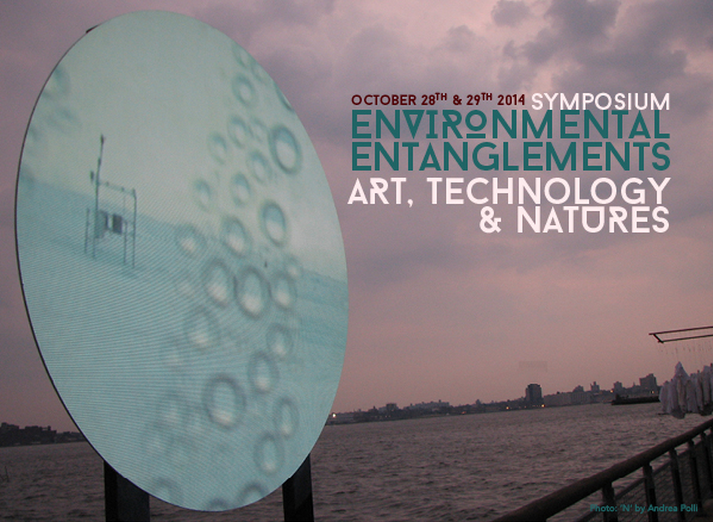
Lancement de l’écothèque
Augures Lab Scénogrrrraphie et Villette Makerz ont le plaisir de vous inviter au lancement de l'écothèque, plateforme collaborative de l'écoscénographie

Symposium « Environmental Entanglements – Art, Technology and Natures »
October 28. -29. (both days from 09-17)
Det Kgl. Danske Videnskabernes Selskab, H. C. Andersens Boulevard 35, 1553 Copenhagen
The symposium is organized in collaboration between four Danish universities:
Sessions & Speakers:
Keynote lecture: Professor John Law
Natures (28.10.2014 at 10:00-13:00 hr)
In the midst of the immense human-made ecological changes the conventional separation between the ‘natural’, the ‘technological’, and the ‘human’ has become increasingly hard to maintain. How the natural and the human are co-evolving and intermingling is a growing field of inquiry. Employing different practical-analytical strategies, artists and academics explore and try to rethink and refigure these entangled natures and what ‘new’ natures mean for our understanding of time, matter and subjectivity. This has given rise to a number of new concepts and approaches. We observe buzzing engagements, for instance, with ‘the anthropocene’ and ‘geological time’. How might such new concepts help us to describe and understand the current ‘epoch’?
Sensing Change and Mediating Climates (28.10.2014 at 14:00-17:00 hr)
Environmental changes unfold over temporal and geographical scales, so tiny or vast that they often escape the human sensorium. Our perception and comprehension of these changes are therefore to a large degree depending on techno-scientific instruments and models that measure and mediate the environment for us. The graphs and images of climate change that so vividly travels the media space have a great impact on the way environmental issues are understood and dealt with and they are thus never neutral. In this session we aim to recover the role of technology in relation to our understanding of the environment. Alongside scientists, artists are employing technologies to explore environmental issues and to unravel the role of technology. How do technologies participate in shaping our understanding of the environmental changes? What kind of sensation do they enable? What kind of politics do images and mediations enact? How do the practices of the artist relate to as well as differ from that of the scientist?
Publics, Participation and Politics (29.10.2014 at 09:30-12:30 hr)
Environmental problems and ‘green’ transitions are inherently traversed with more or less visible political issues. Technologies are not only useful tools for sensing the environment and developing alternative infrastructures, they also give rise to new kinds of ‘politics’, ranging from novel forms of public participation and inclusion of non-humans, to new ways of governing people. In this session we will explore how artists investigate and explicate political entanglements between technologies and ‘natural’ environments and between the human and nonhuman species inhabiting these environments. How are politics and technologies tied up? What kind of alternative ‘political’ engagement might art offer through the use of technologies, and what are the limitations? How does it make sense to sustain an idea about art as autonomous, when working with art entangled with environmental issues? And if not, how might we describe arts’ specific contributions?
Rethinking Infrastructures (29.10.2014 at 13:30-16:30 hr)
Cities, infrastructures and energy sources are proclaimed to constitute great potential for mitigating climate change and environmental problems. Infrastructures are furthermore of interest because they materialize specific ideas and perceptions of how humans inhabit and affect the environment. A growing number of artists and academics have taken up the challenge of re-imagining and re-designing the infrastructures we depend upon, by proposing alternative rationales and creative solutions. In many of these artistic proposal infrastructures are re-conceptualized as dynamic, organic and creative structures, which work across conventional boundaries between the natural and the build environment, human and non-human needs, recreation and function. What role do infrastructures play in the modern society, and how is the notion of infrastructure tied up with certain ideas about society and nature? How is infrastructure re-conceptualized in order to support new ways of living that are less environmentally damaging? What role does art play in the transition to more sustainable infrastructures?
All informations on : www.energyfutures.itu.dk
Registration is free, but there are limited seats. Register here
For any questions, contact Stine Kondrup at skon@itu.dk
Download the interactive invitation here
The symposium is generously funded by: Oticon Fonden and Aksel Tovborg Jensens Legat
Augures Lab Scénogrrrraphie et Villette Makerz ont le plaisir de vous inviter au lancement de l'écothèque, plateforme collaborative de l'écoscénographie
L’Ecole des Arts Décoratifs co-organise la 1ère Biennale sur la nature et le vivant


